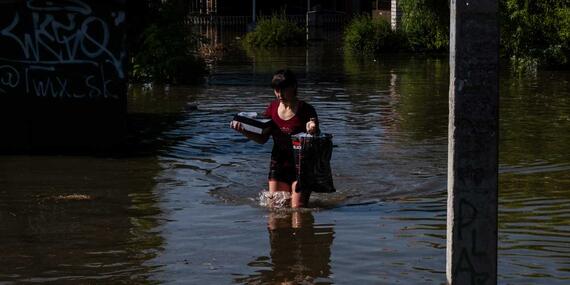Today's top news: Ukraine, Sudan

Ukraine
Along with representatives from five UN agencies and some NGOs, we were in Kherson today to assess the impact of the destruction of the Kakhovka Dam and coordinate the humanitarian response together with local organizations and authorities.
They told us that the disaster will likely get worse in the coming hours as water levels are still rising, and more villages and towns being flooded. This will impact people’s access to essential services and raises serious health risks.
Yesterday, around 1,500 people left their flooded homes, according to the International Organization for Migration, and more people were evacuated today. Most of them are staying in Mykolaiv city which is close to their homes.
Access to water is of main concerns – hundreds of thousands of people depend on the Kakhovka Reservoir for drinking water, and the levels are dropping rapidly. In addition, flooding can also lead to contamination of water sources, increasing health risks.
The destruction of the dam will likely impact food security, as thousands of hectares of agricultural land have been flooded, destroying recently planted crops, FAO tells us. Authorities said that the destruction of the dam decimated irrigation systems in the Dnipro, Kherson and Zaporizhizia regions.
On the response side, we are working non-stop with our humanitarian colleagues to provide communities affected with the assistance they urgently need.
Yesterday, we distributed nearly 12,000 bottles of water, over 1,700 kits with essential supplies for children on the move, and 10,000 purification tablets to five municipalities in Kherson and the city of Mykolaiv. We also distributed ready-to-eat food for 400 people within hours of their evacuation. And today we provided one-month worth of food to 200 people in the Mykolaiv region.
Humanitarian organizations support the authorities in the evacuations and help coordinate the accommodation of people arriving from Kherson in transit centres. They are also delivering hygiene supplies and other basic items to Mykolaiv and Odesa for people who have been evacuated there.
Cash, psychosocial and health support and recreational activities for children at the Kherson train station is also part of the response.
The work will continue in the coming days.
Sudan
Even as the fighting continues, we and our partners are scaling up to reach more people in need. Since 24 May, we have facilitated the movement of at least 148 trucks carrying some 7,400 tons of relief items to various parts of the country.
Ceasefire or not, we will continue to deliver – but we need to see an end to the violence and the looting of humanitarian facilities.
Our revised Humanitarian Response Plan for Sudan is less than 16 per cent funded. Of the US$2.6 billion required for this year’s response, we have received just over $400 million.
